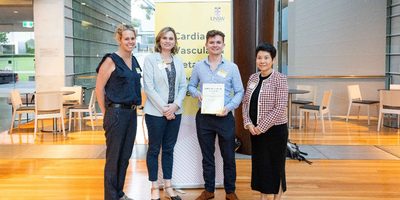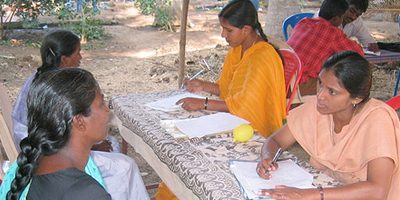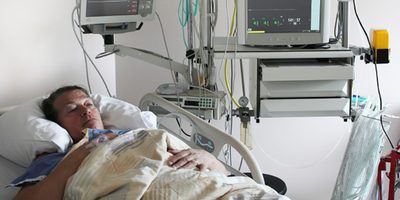
Professor Alta Schutte: championing global action to tackle high blood pressure
Professor Alta Schutte is Principal Theme Lead of Cardiac, Vascular and Metabolic Medicine in the UNSW Faculty of Medicine and Health and co-chair of the Non-Communicable Diseases (NCDs) Research Stream at UNSW School of Population Health. Alta has a joint appointment as Professorial Fellow in the Cardiovascular Division at The George Institute for Global Health, and is co-lead of the Sydney Partnership for Health, Education, Research and Enterprise (SPHERE) Cardiac and Vascular Clinical Academic Group.
Alta joined the School in February 2020 from South Africa where she was the South African Research Chair in the Early Detection and Prevention of Cardiovascular Disease in Africa, hosted by the Hypertension in Africa Research Team at the North-West University; and was Unit Director of the Medical Research Council Extramural Unit for Hypertension and Cardiovascular Disease. She is also Past President of the Southern African Hypertension Society and the Immediate Past President of the International Society of Hypertension.
Alta has extensive experience in population-based studies with a focus on raised blood pressure and cardiovascular disease. She has made significant contributions to raising awareness of the need for global action on raised blood pressure, including publishing over 400 papers and book chapters in this area. Most recently she was co-author on a major study published late August in The Lancet that analysed blood pressure measurements from more than 100 million people taken over three decades in 184 countries.
Alta is involved in numerous international consortia, such as the NCD Risk Factor Collaboration, and Global Burden of Disease study, and is on the Steering Committee of the May Measurement Month blood pressure awareness campaign of the International Society of Hypertension (ISH). She was one of 20 invited authors on the Lancet Commission of Hypertension and is the senior author of the 2020 ISH Global Hypertension Practice Guidelines
Alta shares with us here what motivated her to take up a SHARP (Strategic Hires) Professorship at UNSW and The George Institute, her current focus, and priorities for the future, and more.
What does your role involve and what motivated this career move?
I joined UNSW and The George Institute because I felt that they would give me the platform to make a global impact on reducing blood pressure and the associated risk of cardiovascular disease in high income countries, as well as in low- and middle-income countries where the greatest challenges are experienced.
By working from the context of population health, we can improve health in hundreds to thousands of people, instead of treating a single patient at a time. But we need to develop novel, cost-effective strategies to achieve this. Whether through better medication, better detection and monitoring of high blood pressure, or better overall healthcare and environmental changes, there is a lot of work to be done globally.
What has motivated your focus on high blood pressure and population health?
Globally, high blood pressure (hypertension) is the leading risk factor for cardiovascular disease and death, resulting in approximately 30,000 deaths per day. Over 1.4 billion people globally have hypertension, and four out of five people are living in low- and middle-income countries. Making matters worse, high blood pressure is a silent killer as it has few symptoms.
Working in a middle-income country all my life and visiting many low-resource settings, I am committed to help both the patients and healthcare professionals to address high blood pressure and more broadly improve population health – especially focusing on preventive actions throughout the life-course. That means, ensuring healthy environments and lifestyles from young ages (even before birth) up to older ages.
By improving healthcare setting conditions, including access to quality medications, better training of staff and team-based care, we can take significant strides forward. And this extends to high-income countries, including Australia, where only around 50% are aware they have hypertension.
What are the key highlights from your work?
My work as part of the Lancet Commission in Hypertension has identified that ‘every adult should know their blood pressure’. This was identified as a key action since less than half of people with raised blood pressure are aware of it. This understanding contributed to the setup of the largest ever global awareness campaign of any risk factor, May Measurement Month, which has led to more than 4.2 million people’s blood pressure being measured since 2017.
As President of the ISH, I set out to further develop the 2020 ISH Global Practice Guidelines, which were the first ever to set essential and optimal standards of care applicable to low- and high-resource settings. I hope these short and easy-to-use guidelines will make a large global impact in improving the management of hypertension.
How is your work helping tackle health inequities?
Health inequities are a major crisis that needs direct action. It is for this reason that I contributed to the development of hypertension guidelines that take into account region, ethnicity, income and training status of the healthcare community so they can have a wide impact.
From here, we need greater awareness and effort to address all these factors when designing research, when applying findings, when inviting and supervising students, and so on. Importantly, diversity in a research team brings much creativity, innovation and insights.
What is your priority for the future?
Upon relocating to Australia recently, I became intensely aware that there is complacency in the cardiovascular health agenda regarding blood pressure management. Although cardiovascular disease is strongly prioritised, such as through the Medical Research Future Fund Cardiovascular Mission, the attention is focused on better management of established disease, with limited priority for primary and secondary prevention of hypertension, the leading cause of cardiovascular disease in Australia. Australia is not performing as well as many other high-income countries in managing high blood pressure as demonstrated clearly in the recent paper from the NCD Risk Factor Collaboration noted above. Blood pressure control rates have stagnated over the past decades. A reform in blood pressure management is needed, and I welcome all to get in touch and join forces to make this happen.
In the coming years I aim to establish a national hypertension platform to position Australian research and action in this area on the world stage. By convening national expertise from multiple disciplines, emerging leaders, consumer and community members, non-governmental organisations and policymakers, the platform will be able to steer a roadmap towards rapidly improving blood pressure awareness and control.
How is your work related to effort to the fight COVID-19?
Early in the pandemic, there was much debate in the field of hypertension about whether antihypertensive medication (RAS-inhibitors) should still be used. These medications use the same receptor that the SARS-CoV-2 virus uses to enter the cells. It was unknown whether the medication would increase the likelihood of infection or may affect the health outcomes in patients with COVID-19. Several randomised trials started around the world to address this question. I am leading a global meta-analysis team to consolidate findings from many of these trials with the aim of determining safety (also in certain sub-groups) to continue with RAS-inhibitors, as demonstrated by some individual trials already. We got many trialists to contribute unpublished data and plan to present our interesting findings at a major international meeting in November, with simultaneous publication.
How has the covid-19 pandemic and bushfire emergency, such as in Australia, influenced your view of population health and priorities for the future?
Both the bushfires and COVID-19 resulted in a new understanding for me on managing health emergencies. One emerging aspect is telecare and telemedicine, as remote monitoring of patients has sky-rocketed during the pandemic due to minimise infection. I am very interested in novel technologies to monitor blood pressure using cloud-based systems and low-energy solutions that could be used in areas without electricity. These developments need to be evaluated, consolidated and implemented and is likely to substantially influence mobile healthcare in the decades to come. I was also invited recently to share my thoughts on this in Nature Reviews Cardiology.









